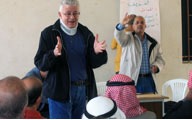
Strengthening Linkages in Targeted ‘Growth Poles’
A long civil war coupled with continued instability and conflict have created a challenging environment in Lebanon. Within this environment, the country’s resilient and entrepreneurial people have worked to return Lebanon to its position as a significant player in the global market economy. In 2005, these private sector efforts were helped when the government began a process of market liberalization, reinforced by the signing of the European Union-Mediterranean Free Trade Agreement, which opened European markets up to Lebanese products. Even with this and other positive growth trends, existing dynamics and entrenched sector constraints meant that there was substantial untapped potential in Lebanon’s agro-food sector. Lebanon’s agribusinesses needed to grow to take full advantage of the increasing consumer demand for their products in domestic, regional and diasporic markets.
From 2005 to 2008, ACDI/VOCA’s Action for Sustainable Agro-Industry in Lebanon (ASAIL) project, a 2½-year program funded by USAID, used a value chain approach to develop two main subsectors in Lebanon: niche Lebanese foodstuffs and small ruminant (goat and sheep) dairy products. By increasing the efficiency of input, production, processing and marketing businesses, and by strengthening the linkages among each in three targeted “growth poles” of the country, ACDI/VOCA raised the income and profitability of small- and medium-scale enterprises (SMEs) within these two value chains.
ACDI/VOCA used business-oriented, market-informed activities to reinforce rural-urban and coastal-inland linkages and develop strong demand-driven market channels. The project
- strengthened the capability of agricultural producers to manage their businesses by responding to market demands
- upgraded the technical and management capacity of small- and medium-scale agro-food businesses
- reinforced agro-food supply chain linkages to develop joint marketing strategies and foster collaboration
- helped integrate service providers into the targeted value chains, including input suppliers, technical assistance providers and financial institutions
Working closely with regional business chambers, trade associations and local partner Vitech Consulting, ACDI/VOCA provided technical assistance, training and follow-up services in marketing, business planning and product development for 82 processors. A variety of advertising tools (e.g., websites, brochures, logos, labels, nutrition fact panels, packages) were developed for beneficiaries, who participated in seven domestic and international trade shows. Extensive training was also provided in ISO, HACCP and GMP. Through a partnership with a large Lebanese bank, ACDI/VOCA also facilitated access to $1.9 million in loans for producers and SMEs to invest in their businesses, supported by project trainings on smart business practices and financial management.
As a result of project interventions, processor SMEs and cooperatives exceeded $2.2 million in direct export sales to buyers in Europe, the Middle East and Africa. To increase consumer awareness of the quality of products and brands available locally, ACDI/VOCA also helped organize a national food and heritage festival. The festival, which was the first of its kind in Lebanon, had 140 exhibitors and over 6,000 visitors.
Building on ACDI/VOCA’s combination of commercial and development experience, ASAIL helped stakeholders expand their market access for select value-added products through mechanisms flexible enough to accommodate a continuous process of market-driven innovation and entrepreneurship that will continue beyond the life of the project. For example, in the spring of 2007, ASAIL established three product development, improvement and testing centers in Lebanon, located at the Chambers of Commerce, Industry and Agriculture (CCIA) in Zahle, Saida and Tripoli. These centers provide research and improvements to existing products and helped to develop new value-added products with a focus on fruit and vegetable products, desserts and sweets, and distillates and oils. By the program’s end, the centers had provided services to over 40 SMEs and cooperatives, developed 23 new products and improved 15 existing products. The chambers directly employed the plant managers to oversee operations and technical quality control, demonstrating their commitment to the centers and the invaluable services they provide to the surrounding community of agribusiness SMEs.
In the face of the volatile political and security environment, ASAIL often had to adapt its activities to respond to the changing needs of its clients. Following the 2006 war between Israel and Hezbollah, ACDI/VOCA conducted an assessment of the conflict’s impact on key herders, hallabs (milk middlemen), processors and financial institutions. This assessment resulted in increased services and training provided to SMEs (market linkages, product diversification, business planning and access to loans) and producers (fattening, vaccinations, transport logistics and group organization). Vaccination campaigns in the winter of 2007 to small ruminant producers benefited 7,500 family members spread out across more than 40 villages in 6 cazas (similar to counties) owning over 312,000 small ruminant animals. During this period, ACDI/VOCA also secured new sources of funding for two relief programs designed primarily to supply animal feed rations to conflict-affected small ruminant herders in the north, east and west Bekaa valley. In all, 1,039 herder households were assisted, and interventions helped ensure the steady supply of milk available to small ruminant dairy value chain actors that year.
Throughout ASAIL, emphasis was placed on strengthening the entire value chain, removing constraints and increasing transactional efficiencies to maximize returns to stakeholders in the targeted subsectors. The program achieved great progress towards expanding economic opportunities for strategic yet underserved participants in Lebanon’s economy.
PDF version of profile (1.02 MB)





